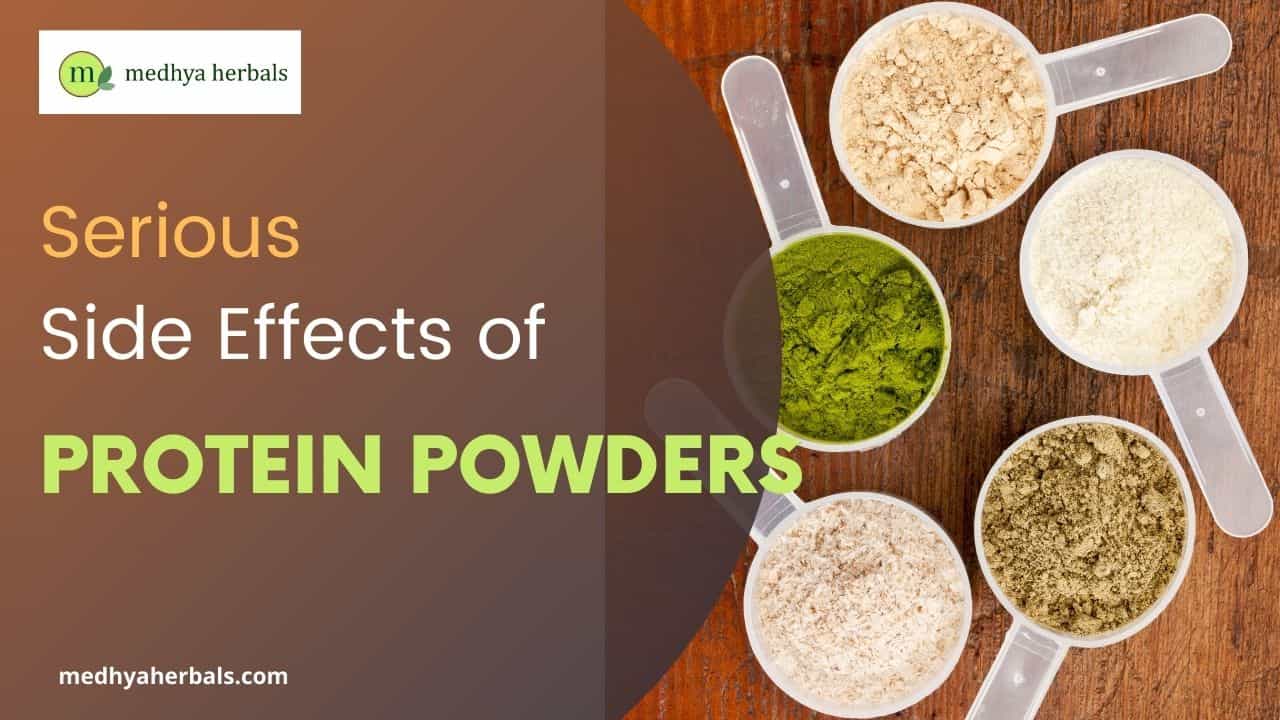Protein shakes and meal replacement with protein powder breakfast smoothies is one of the go to option these days! Whether it is suggested by your friend, nutritionist or you get into it to keep off your fears of insufficient proteins, you need to know the dangerous protein powder side effects first!
This is because when you start taking protein powders and replace your healthy meals with protein shakes; no doubt you feel great! They are supposed to give you instant results of weight loss, energy and satiation.
However, protein powder side effects start appearing in the mid to short term as your body doesn’t really know what to do with these artificially produced and utterly dense source of an essential macro nutrient!
At Medhya Herbals, we have worked with multiple women and men, who were really struggling with poor digestion, bloating and severe health imbalances as a result of replacing their meals with protein rich smoothies.
And as these people removed the artificial supplements and instead started taking in nutrient dense meals per their body’s need, they saw immediate improvement in their health condition.
So, here with this post we are going to go through some essential facts about protein powder side effects and how you can avoid them through healthier options in your diet. Let’s get started!
What are Protein Powders and what do they do?
Protein powders are dietary supplements with a high concentration of proteins inside them.
Most of the time, people who take protein powders are those who exercise and seek to build muscle mass. Because of their high protein content, these supplements can indeed help in building muscle. Some persons take protein powders for weight loss purposes too.
Whey Protein is the most common Protein Powder
There are different forms of protein powder. However, the most common ones, especially with bodybuilders, is whey protein.
Whey protein powders are manufactured by highly concentrating the substance from cow milk. Other proteins can be derived from eggs, casein, egg, peas and so on.
But whatever the form of protein powder or the purpose of use, everyone deserves awareness. They need to know the potential dangers and protein powder side effects to avoid supplementing on proteins indiscriminately.
Protein Powder Side Effects that can Risk Your Health in the Long Term!
Protein Powders are getting a lot of attention these days. Many more people are replacing their meals or using them as supplements without being aware of associated dangers.
Many of these products are advertised as “natural” or “organic” and promise instant results. Also, more manufacturers are producing protein supplements with sensational advertisements to entice people to buy them.
People take these protein powders and supplements for lots of different reasons. However, you deserve to be aware of the hidden protein powder side effects so you can make a better and informed choice.
So, how can protein powders harm you? And why should you stay away from them? Here are some reasons:
1. Problems with your gut
Your stomach and intestines might suffer as a result of protein powder preparations.
This is because such high amount of isolated proteins that are present in protein powders do not digest quickly. Thus, when you take these supplements, your digestive system has to work hard to break it.
Also, whey protein has been found to deplete the natural microbial flora in your gut. This is because of substances like lactoferrin, especially in whey milk.
These factors combined can lead to constipation, accumulation of gas, and bloating.
2. Liver problems
True enough, they help build muscle. However, another hidden side effect of protein powders can show up when you fail to exercise adequately.
It will cause an overburdening of your liver because all the proteins have to go there for processing. Over time, the excessive burdening leads to liver damage.
3. Your kidneys might be in danger too
You might be setting up yourself for kidney problems with regular consumption of these protein supplements.
One of the major means of excreting proteins is by breaking them down into urea. You can then pass out urea in urine. That can place excessive stress on your kidneys and might even lead to kidney stones.
4. Weight gain
It is very easy to underestimate the amount of proteins you are taking through the protein powders. After all, it is highly concentrated in the powder.
There is a danger here because you can unknowingly exceed your daily calorie intake. And what will your body do with the excess calories? It begins to store them up as body fat, leading to weight gain.
5. They can cause Acne
Protein powders can be harmful because they contain hormones and bioactive peptides. These substances can increase the production of sebum, an oily substance secreted by sebaceous glands on the skin.
If care is not taken, you will have excessive sebum blocking your skin pores. That gives room for acne-causing bacteria to grow, resulting in acne.
Also, protein powders can cause inflammation, which can lead to acne too.
6. Increased blood sugar levels
The American Heart Association recommends a daily limit for added sugar. The value is 24g for women and 36g for men.
Sometimes, one scoop of protein powder can contain as much as 23g of added sugar. Now, if you’ve had 23g of added sugar in just one scoop, you see how much more likely you are to exceed the limit.
You are left with high blood sugar levels and an increased risk of weight gain.
7. There is less regulation
Food and Drug Associations do not tightly regulate protein powders. They generally leave it up to the manufacturers to evaluate the safety of the product.
The manufacturers are thus free to add whatever they might want to add. Thus sometimes, there are additives such as caffeine, creatine and sweeteners (artificial or real) in these powders but are not mentioned in advertisements.
And often, some vendors looking for profit margins only include those ingredients that they want on the label. Thus, you don’t even know what’s in there even though you read the label well.
This is another danger of protein powders to be wary of.

8. Increased insulin levels in the blood
Consuming protein powders lead to increased levels of insulin in the body. That won’t help with your sugar balance. If you have high blood insulin for a long time, you can even begin to develop insulin resistance.
9. Your bones and joints are not left out
This is another hidden protein powder side effects. They can reduce bone mineral density, leading to osteoporosis. Osteoporosis on its own makes your bones brittle and prone to fractures.
What is the effect on your joints? Acid crystals are deposited in your joints, leading to gouty arthritis, a condition that causes painful joints.
10. Heart complications
Another reason why you should stay away from protein powders is the adverse effect on your heart. Over consumption can cause palpitations, arrhythmia (irregular heartbeat), cardiac arrest, etc.
Furthermore, experts have linked high protein diets with increased levels of cholesterol in the body. High levels of cholesterol and triglycerides can block your blood vessels and cause high blood pressure. They can also lead to increased sugar levels and problems of acidity.
11. Nutritional Imbalances
People who take protein powders like whey protein do so because they are on a diet. The diet is usually a low carb diet and maybe with higher fats.
Also since protein powders are really filling, so some people might take these protein supplements as a substitute for healthy carbs in the diet.
This leads to nutritional deficiencies with higher proteins. The body takes steps to correct this by breaking down fats for energy, which can result in ketosis. Ketones are acidic in nature and can contribute to acidosis.
12. Protein powders can be toxic
Here is another way protein powders can be harmful. They can contain toxins, probably as a result of the manufacturing process or other contaminants.
Toxins may include heavy metals like lead, arsenic, mercury, and cadmium. Headaches, fatigue, constipation, and muscle/joint pains are the side effects of these toxins.
Here’s What You Should Do Instead | Avoid Protein Powders Side Effects
Protein powders have been around for a long time and many people have embraced them. However as we saw a majority of people are also struggling with protein powder side effects even without knowing or noticing it.
With this post, you now know that you should take heed while planning to replace your meals with protein shakes. However, if you are still concerned about your protein intake, then here are important things that you should know.
How Much Protein Do You Actually Need?
The European Food Safety Authority(EFSA) developed the dietary reference values(DRV) for protein. An average adult is expected to consume at least 0.83g and maximum of 1.2 of proteins per kg of body weight per day.
In other words, an average 70kg person should take at least 58 g of protein and maximum of 84g of protein every day.
Surprisingly, this much amount of protein is easily fulfilled by consuming 3-4 servings per day of diverse beans, lentils and grains.
Some Sources of Protein

If you consume animal based products, then you generally are fine if you consume at least 1 serving of meat, poultry or fish and combine it with other plant based foods.
However, vegetarians and vegans are particularly concerned about their intake. So, here are some food sources that you can include through out the day:
- Half cup cooked Beans: garbanzos (chickpeas), kidney, pinto, navy (125-150 g)
- Lentils (100 g)
- Peas: split (100 g) or green (80 g)
- Edamame (80 g)
- Tofu (125 g)
- Tempeh (165 g)
- Soy milk (1 cup or 250 mL)
- Peanuts: 1/4 cup (35-40 g)
- Seitan: 85 grams
- Quinoa: 1 cup cooked (185 g)
- Pistachios: 1/4 cup (30 g)
- Pumpkin seeds: 1/4 cup roasted (35 g)
References


Nidhi thank you for your informative article about the dangers of protein powders. What do you know about the side effects of Mikuna Cho Cho protein powder. I have just started it today at 1 tablespoon. My doctor wants me to take it between meals. Any thoughts?
Thank you.
Sandy
Hi Sandy, seems Mikuna Cho cho is prepared from an ancient grain. Irrespective of the origins of the grain (where most of the marketing efforts go), it is suggested not to consume high amounts of protein powders when your digestive fire is weak. It can further tax the body systems, specifically liver leading to health issues. It would be better to consume this grain or other alternatives as such in properly cooked form so that it is better absorbed by the body for its maximum benefits. Hope it helps!
Such an informative article about the danger of protein powder. Thanks for sharing this post with us and I really like your post, keep sharing this kind of informational post.
Thanks for sharing informative article.